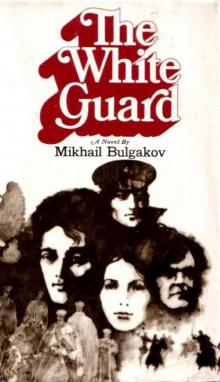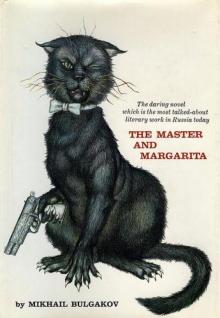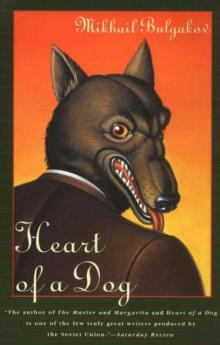- Home
- Mikhail Bulgakov
The Master and Margarita
The Master and Margarita Read online
The Master and Margarita
Mikhail Bulgakov
THE MASTER AND MARGARITA
‘... who are you, then?’
‘I am part of that power which eternally wills evil and eternally works good.’
Goethe, Faust[1]
MIKHAIL BULGAKOV was born in Kiev in May 1891. He studied and briefly practised medicine and, after indigent wanderings through revolutionary Russia and the Caucasus, he settled in Moscow in 1921. His sympathetic portrayal of White characters in his stories, in the plays The Days of the Turbins (The White Guard), which enjoyed great success at the Moscow Art Theatre in 1926, and Flight (1927), and his satirical treatment of the officials of the New Economic Plan, led to growing criticism, which became violent after the play The Purple Island. His later works treat the subject of the artist and the tyrant under the guise of historical characters, with plays such as Molière, staged in 1936, Don Quixote, staged in 1940, and Pushkin, staged in 1943. He also wrote a brilliant biography, highly original in form, of his literary hero, Molière, but The Master and Margarita, a fantasy novel about the devil and his henchmen set in modern Moscow, is generally considered his masterpiece. Fame, at home and abroad, was not to come until a quarter of a century after his death at Moscow in 1940.
RICHARD PEVEAR and LARISSA VOLOKHONSKY have produced acclaimed translations of works by Mikhail Bulgakov, Fyodor Dostoyevsky, Nikolai Gogol, Anton Chekhov, and Leo Tolstoy. They have twice won the PEN/Book-of-the-Month Club Translation Prize for Dostoevsky’s The Brothers Karamazov and for Tolstoy’s Anna Karenina. Their translations of Tolstoy’s What Is Art? and Anna Karenina are published in Penguin Classics. Pevear, a native of Boston, and Volokhonsky, of St. Petersburg, and married to each other and live in Paris.
First published as Master i Margarita in serial form in Moskva, 1966-7
Text copyright © Mikhail Bulgakov, 1966, 1967
Translation copyright © Richard Pevear and Larissa Volokhonsky, 1997
BOOK ONE
CHAPTER 1
Never Talk with Strangers
At the hour of the hot spring sunset two citizens appeared at the Patriarch’s Ponds.[2] One of them, approximately forty years old, dressed in a grey summer suit, was short, dark-haired, plump, bald, and carried his respectable fedora hat in his hand. His neatly shaven face was adorned with black horn-rimmed glasses of a supernatural size. The other, a broad-shouldered young man with tousled reddish hair, his checkered cap cocked back on his head, was wearing a cowboy shirt, wrinkled white trousers and black sneakers.
The first was none other than Mikhail Alexandrovich Berlioz,[3] editor of a fat literary journal and chairman of the board of one of the major Moscow literary associations, called Massolit[4] for short, and his young companion was the poet Ivan Nikolaevich Ponyrev, who wrote under the pseudonym of Homeless.[5]
Once in the shade of the barely greening lindens, the writers dashed first thing to a brightly painted stand with the sign: ‘Beer and Soft Drinks.’
Ah, yes, note must be made of the first oddity of this dreadful May evening. There was not a single person to be seen, not only by the stand, but also along the whole walk parallel to Malaya Bronnaya Street. At that hour when it seemed no longer possible to breathe, when the sun, having scorched Moscow, was collapsing in a dry haze somewhere beyond Sadovoye Ring, no one came under the lindens, no one sat on a bench, the walk was empty.
‘Give us seltzer,’ Berlioz asked.
‘There is no seltzer,’ the woman in the stand said, and for some reason became offended.
‘Is there beer?’ Homeless inquired in a rasping voice.
‘Beer’ll be delivered towards evening,’ the woman replied.
‘Then what is there?’ asked Berlioz.
‘Apricot soda, only warm,’ said the woman.
‘Well, let’s have it, let’s have it! ...’
The soda produced an abundance of yellow foam, and the air began to smell of a barber-shop. Having finished drinking, the writers immediately started to hiccup, paid, and sat down on a bench face to the pond and back to Bronnaya.
Here the second oddity occurred, touching Berlioz alone. He suddenly stopped hiccuping, his heart gave a thump and dropped away somewhere for an instant, then came back, but with a blunt needle lodged in it. Besides that, Berlioz was gripped by fear, groundless, yet so strong that he wanted to flee the Ponds at once without looking back.
Berlioz looked around in anguish, not understanding what had frightened him. He paled, wiped his forehead with a handkerchief, thought: ‘What’s the matter with me? This has never happened before. My heart’s acting up ... I’m overworked ... Maybe it’s time to send it all to the devil and go to Kislovodsk ...’[6]
And here the sweltering air thickened before him, and a transparent citizen of the strangest appearance wove himself out of it. A peaked jockey’s cap on his little head, a short checkered jacket also made of air ... A citizen seven feet tall, but narrow in the shoulders, unbelievably thin, and, kindly note, with a jeering physiognomy.
The life of Berlioz had taken such a course that he was unaccustomed to extraordinary phenomena. Turning paler still, he goggled his eyes and thought in consternation: ‘This can’t be!...’
But, alas, it was, and the long, see-through citizen was swaying before him to the left and to the right without touching the ground.
Here terror took such possession of Berlioz that he shut his eyes. When he opened them again, he saw that it was all over, the phantasm had dissolved, the checkered one had vanished, and with that the blunt needle had popped out of his heart.
‘Pah, the devil!’ exclaimed the editor. ‘You know, Ivan, I nearly had heatstroke just now! There was even something like a hallucination ...’ He attempted to smile, but alarm still jumped in his eyes and his hands trembled. However, he gradually calmed down, fanned himself with his handkerchief and, having said rather cheerfully: ‘Well, and so ...’ went on with the conversation interrupted by their soda-drinking.
This conversation, as was learned afterwards, was about Jesus Christ. The thing was that the editor had commissioned from the poet a long anti-religious poem for the next issue of his journal. Ivan Nikolaevich had written this poem, and in a very short time, but unfortunately the editor was not at all satisfied with it. Homeless had portrayed the main character of his poem — that is, Jesus — in very dark colours, but nevertheless the whole poem, in the editor’s opinion, had to be written over again. And so the editor was now giving the poet something of a lecture on Jesus, with the aim of underscoring the poet’s essential error.
It is hard to say what precisely had let Ivan Nikolaevich down — the descriptive powers of his talent or a total unfamiliarity with the question he was writing about — but his Jesus came out, well, completely alive, the once-existing Jesus, though, true, a Jesus furnished with all negative features.
Now, Berlioz wanted to prove to the poet that the main thing was not how Jesus was, good or bad, but that this same Jesus, as a person, simply never existed in the world, and all the stories about him were mere fiction, the most ordinary mythology.
It must be noted that the editor was a well-read man and in his conversation very skilfully pointed to ancient historians — for instance, the famous Philo of Alexandria[7] and the brilliantly educated Flavius Josephus[8] — who never said a word about the existence of Jesus. Displaying a solid erudition, Mikhail Alexandrovich also informed the poet, among other things, that the passage in the fifteenth book of Tacitus’s famous Annals,[9] the forty-fourth chapter, where mention is made of the execution of Jesus, was nothing but a later spurious interpolation.
The poet, for whom everything the editor was telling him was new, listened attentively to Mikhail Alexandrovich, fixing his pert green eyes on him, and merely hiccuped from time to time, cursing the apricot soda under his breath.
‘There’s not a single Eastern religion,’ Berlioz was saying, ‘in which, as a rule, an immaculate virgin did not give birth to a god. And in just the same way, without inventing anything new, the Christians created their Jesus, who in fact never lived. It’s on this that the main emphasis should be placed ...’
Berlioz’s high tenor rang out in the deserted walk, and as Mikhail Alexandrovich went deeper into the maze, which only a highly educated man can go into without risking a broken neck, the poet learned more and more interesting and useful things about the Egyptian Osiris,[10] a benevolent god and the son of Heaven and Earth, and about the Phoenician god Tammuz,[11] and about Marduk,[12] and even about a lesser known, terrible god, Vitzliputzli,[13] once greatly venerated by the Aztecs in Mexico. And just at the moment when Mikhail Alexandrovich was telling the poet how the Aztecs used to fashion figurines of Vitzliputzli out of dough — the first man appeared in the walk.
Afterwards, when, frankly speaking, it was already too late, various institutions presented reports describing this man. A comparison of them cannot but cause amazement. Thus, the first of them said that the man was short, had gold teeth, and limped on his right leg. The second, that the man was enormously tall, had platinum crowns, and limped on his left leg. The third laconically averred that the man had no distinguishing marks. It must be acknowledged that none of these reports is of any value.
First of all, the man described did not limp on any leg, and was neither short nor enormous, but simply tall. As for his teeth, he had platinum crowns on the left side and gold on the right. He was wearing
an expensive grey suit and imported shoes of a matching colour. His grey beret was cocked rakishly over one ear; under his arm he carried a stick with a black knob shaped like a poodle’s head.[14] He looked to be a little over forty. Mouth somehow twisted. Clean-shaven. Dark-haired. Right eye black, left — for some reason — green. Dark eyebrows, but one higher than the other. In short, a foreigner.[15]
Having passed by the bench on which the editor and the poet were placed, the foreigner gave them a sidelong look, stopped, and suddenly sat down on the next bench, two steps away from the friends.
‘A German...’ thought Berlioz. ‘An Englishman ...’ thought Homeless. ‘My, he must be hot in those gloves.’
And the foreigner gazed around at the tall buildings that rectangularly framed the pond, making it obvious that he was seeing the place for the first time and that it interested him. He rested his glance on the upper floors, where the glass dazzlingly reflected the broken-up sun which was for ever departing from Mikhail Alexandrovich, then shifted it lower down to where the windows were beginning to darken before evening, smiled condescendingly at something, narrowed his eyes, put his hands on the knob and his chin on his hands.
‘For instance, Ivan,’ Berlioz was saying, ‘you portrayed the birth of Jesus, the son of God, very well and satirically, but the gist of it is that a whole series of sons of God were born before Jesus, like, say, the Phoenician Adonis,[16] the Phrygian Attis,[17] the Persian Mithras.[18] And, to put it briefly, not one of them was born or ever existed, Jesus included, and what’s necessary is that, instead of portraying his birth or, suppose, the coming of the Magi,[19] you portray the absurd rumours of their coming. Otherwise it follows from your story that he really was born! ...’
Here Homeless made an attempt to stop his painful hiccuping by holding his breath, which caused him to hiccup more painfully and loudly, and at that same moment Berlioz interrupted his speech, because the foreigner suddenly got up and walked towards the writers. They looked at him in surprise.
‘Excuse me, please,’ the approaching man began speaking, with a foreign accent but without distorting the words, ‘if, not being your acquaintance, I allow myself... but the subject of your learned conversation is so interesting that ...’
Here he politely took off his beret, and the friends had nothing left but to stand up and make their bows.
‘No, rather a Frenchman ...’ thought Berlioz.
‘A Pole? ...’ thought Homeless.
It must be added that from his first words the foreigner made a repellent impression on the poet, but Berlioz rather liked him — that is, not liked but ... how to put it ... was interested, or whatever.
‘May I sit down?’ the foreigner asked politely, and the friends somehow involuntarily moved apart; the foreigner adroitly sat down between them and at once entered into the conversation:
‘Unless I heard wrong, you were pleased to say that Jesus never existed?’ the foreigner asked, turning his green left eye to Berlioz.
‘No, you did not hear wrong,’ Berlioz replied courteously, ‘that is precisely what I was saying.’
‘Ah, how interesting!’ exclaimed the foreigner.
‘What the devil does he want?’ thought Homeless, frowning.
‘And you were agreeing with your interlocutor?’ inquired the stranger, turning to Homeless on his right.
‘A hundred per cent!’ confirmed the man, who was fond of whimsical and figurative expressions.
‘Amazing!’ exclaimed the uninvited interlocutor and, casting a thievish glance around and muffling his low voice for some reason, he said: ‘Forgive my importunity, but, as I understand, along with everything else, you also do not believe in God?’ He made frightened eyes and added: ‘I swear I won’t tell anyone!’
‘No, we don’t believe in God,’ Berlioz replied, smiling slightly at the foreign tourist’s fright, ‘but we can speak of it quite freely.’
The foreigner sat back on the bench and asked, even with a slight shriek of curiosity:
‘You are — atheists?!’
‘Yes, we’re atheists,’ Berlioz smilingly replied, and Homeless thought, getting angry: ‘Latched on to us, the foreign goose!’
‘Oh, how lovely!’ the astonishing foreigner cried out and began swivelling his head, looking from one writer to the other.
‘In our country atheism does not surprise anyone,’ Berlioz said with diplomatic politeness. ‘The majority of our population consciously and long ago ceased believing in the fairy tales about God.’
Here the foreigner pulled the following stunt: he got up and shook the amazed editor’s hand, accompanying it with these words:
‘Allow me to thank you with all my heart!’
‘What are you thanking him for?’ Homeless inquired, blinking.
‘For some very important information, which is of great interest to me as a traveller,’ the outlandish fellow explained, raising his finger significantly.
The important information apparently had indeed produced a strong impression on the traveller, because he passed his frightened glance over the buildings, as if afraid of seeing an atheist in every window.
‘No, he’s not an Englishman ...’ thought Berlioz, and Homeless thought: ‘Where’d he pick up his Russian, that’s the interesting thing!’ and frowned again.
‘But, allow me to ask you,’ the foreign visitor spoke after some anxious reflection, ‘what, then, about the proofs of God’s existence, of which, as is known, there are exactly five?’
‘Alas!’ Berlioz said with regret. ‘Not one of these proofs is worth anything, and mankind shelved them long ago. You must agree that in the realm of reason there can be no proof of God’s existence.’
‘Bravo!’ cried the foreigner. ‘Bravo! You have perfectly repeated restless old Immanuel’s[20] thought in this regard. But here’s the hitch: he roundly demolished all five proofs, and then, as if mocking himself, constructed a sixth of his own.’
‘Kant’s proof,’ the learned editor objected with a subtle smile, ‘is equally unconvincing. Not for nothing did Schiller[21] say that the Kantian reasoning on this question can satisfy only slaves, and Strauss[22] simply laughed at this proof.’
Berlioz spoke, thinking all the while: ‘But, anyhow, who is he? And why does he speak Russian so well?’
‘They ought to take this Kant and give him a three-year stretch in Solovki[23] for such proofs!’ Ivan Nikolaevich plumped quite unexpectedly.
‘Ivan!’ Berlioz whispered, embarrassed.
But the suggestion of sending Kant to Solovki not only did not shock the foreigner, but even sent him into raptures.
‘Precisely, precisely,’ he cried, and his green left eye, turned to Berlioz, flashed. ‘Just the place for him! Didn’t I tell him that time at breakfast: “As you will, Professor, but what you’ve thought up doesn’t hang together. It’s clever, maybe, but mighty unclear. You’ll be laughed at.”’
Berlioz goggled his eyes. ‘At breakfast ... to Kant? ... What is this drivel?’ he thought.
‘But,’ the outlander went on, unembarrassed by Berlioz’s amazement and addressing the poet, ‘sending him to Solovki is unfeasible, for the simple reason that he has been abiding for over a hundred years now in places considerably more remote than Solovki, and to extract him from there is in no way possible, I assure you.’
‘Too bad!’ the feisty poet responded.
‘Yes, too bad!’ the stranger agreed, his eye flashing, and went on: ‘But here is a question that is troubling me: if there is no God, then, one may ask, who governs human life and, in general, the whole order of things on earth?’
‘Man governs it himself,’ Homeless angrily hastened to reply to this admittedly none-too-clear question.
‘Pardon me,’ the stranger responded gently, ‘but in order to govern, one needs, after all, to have a precise plan for a certain, at least somewhat decent, length of time. Allow me to ask you, then, how can man govern, if he is not only deprived of the opportunity of making a plan for at least some ridiculously short period — well, say, a thousand years - but cannot even vouch for his own tomorrow?

 The White Guard
The White Guard The Master and Margarita
The Master and Margarita A Dog's Heart
A Dog's Heart Diaboliad
Diaboliad Notes on the Cuff and Other Stories
Notes on the Cuff and Other Stories Heart of a Dog
Heart of a Dog